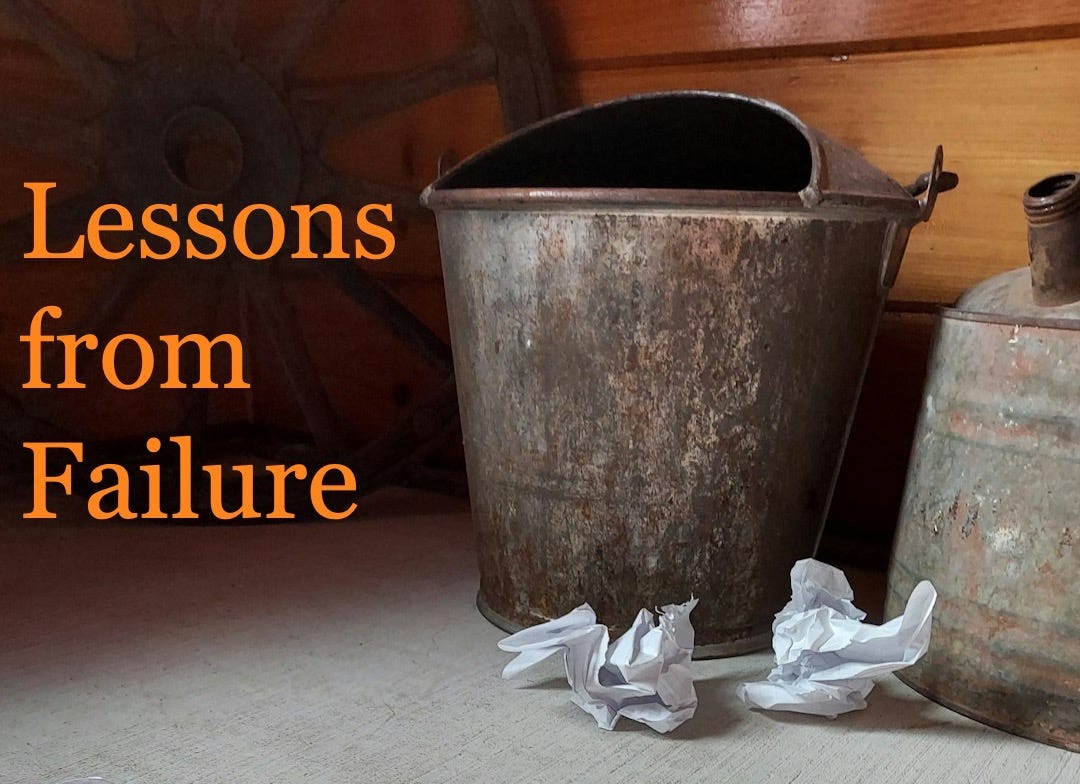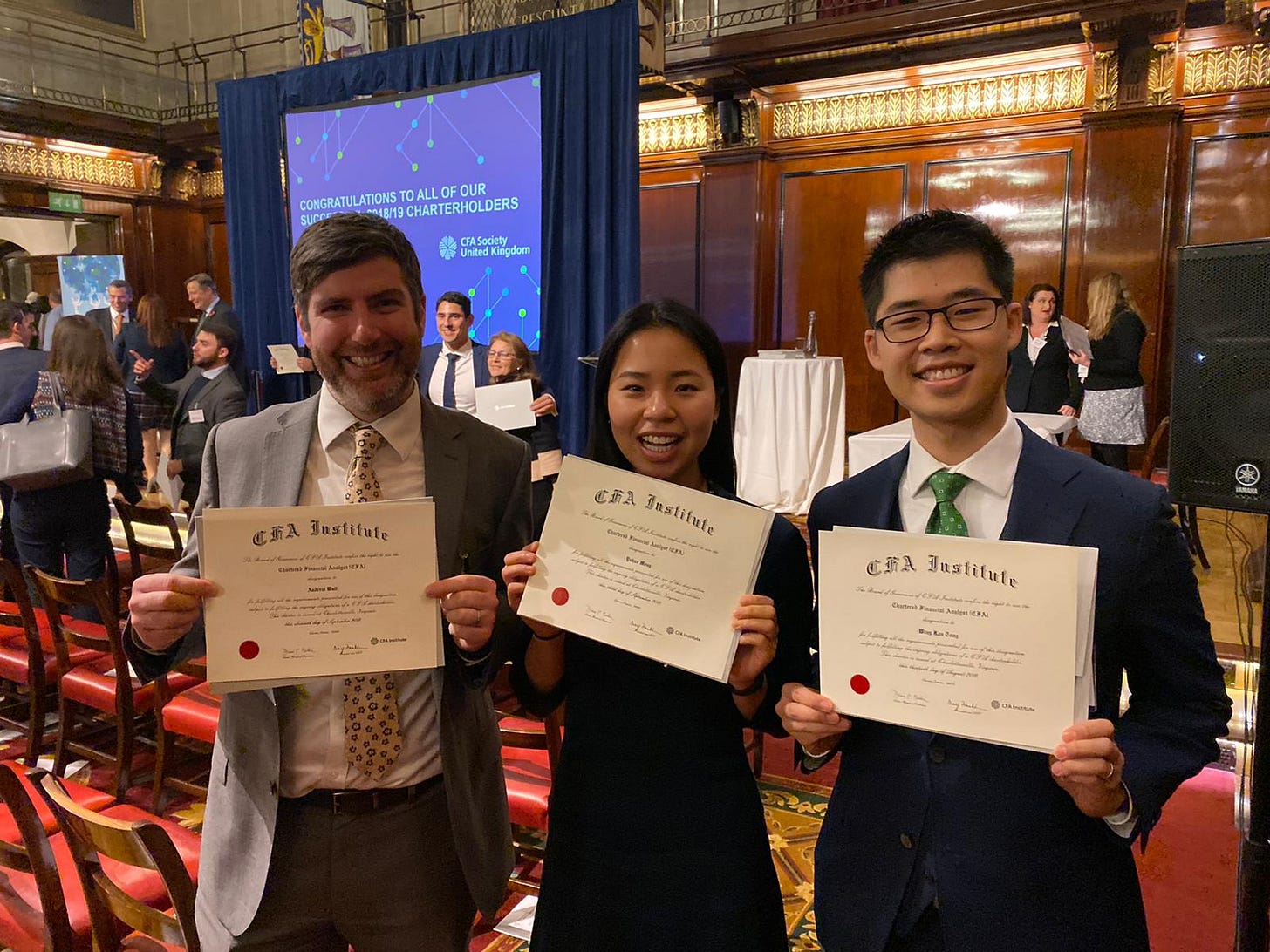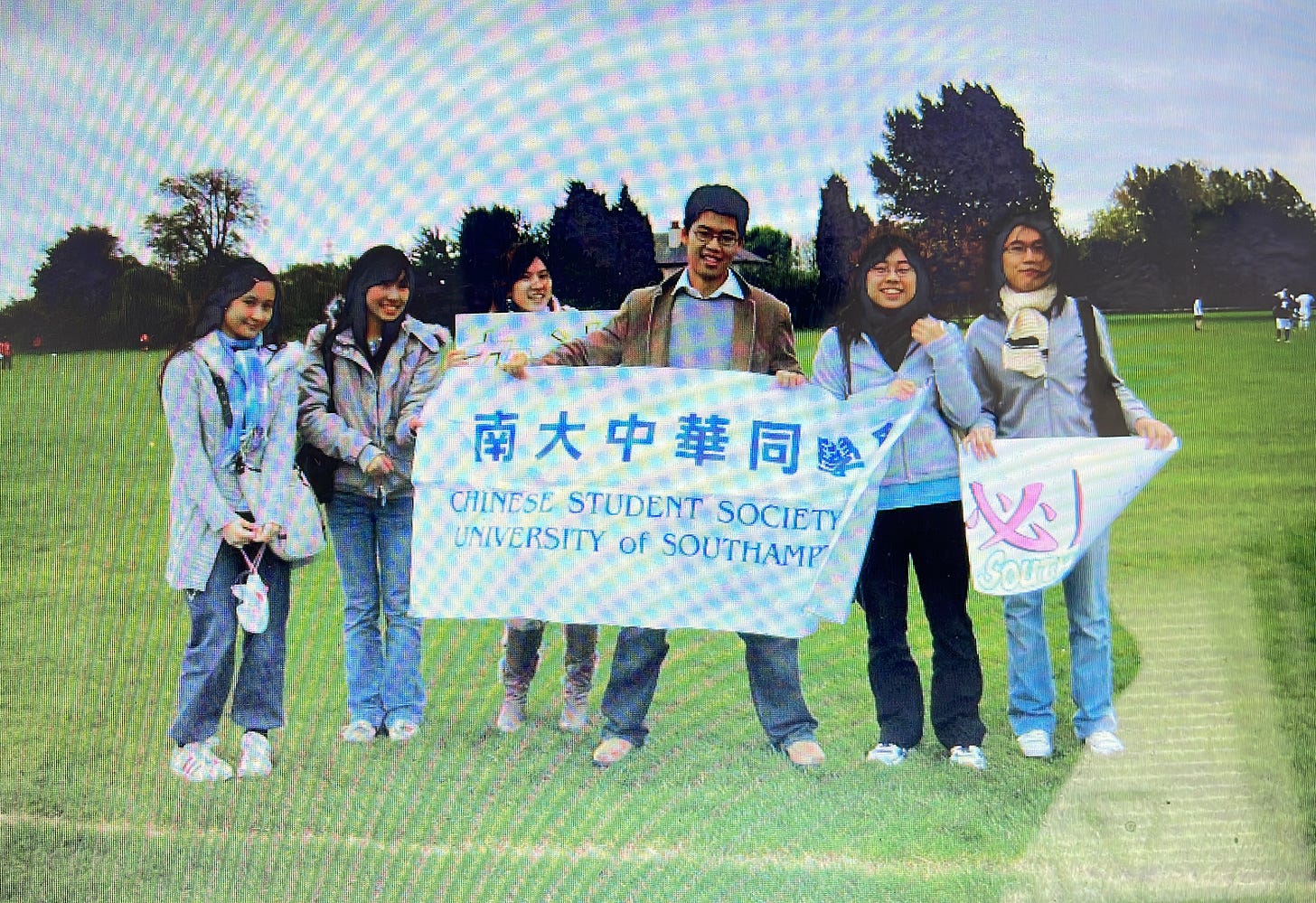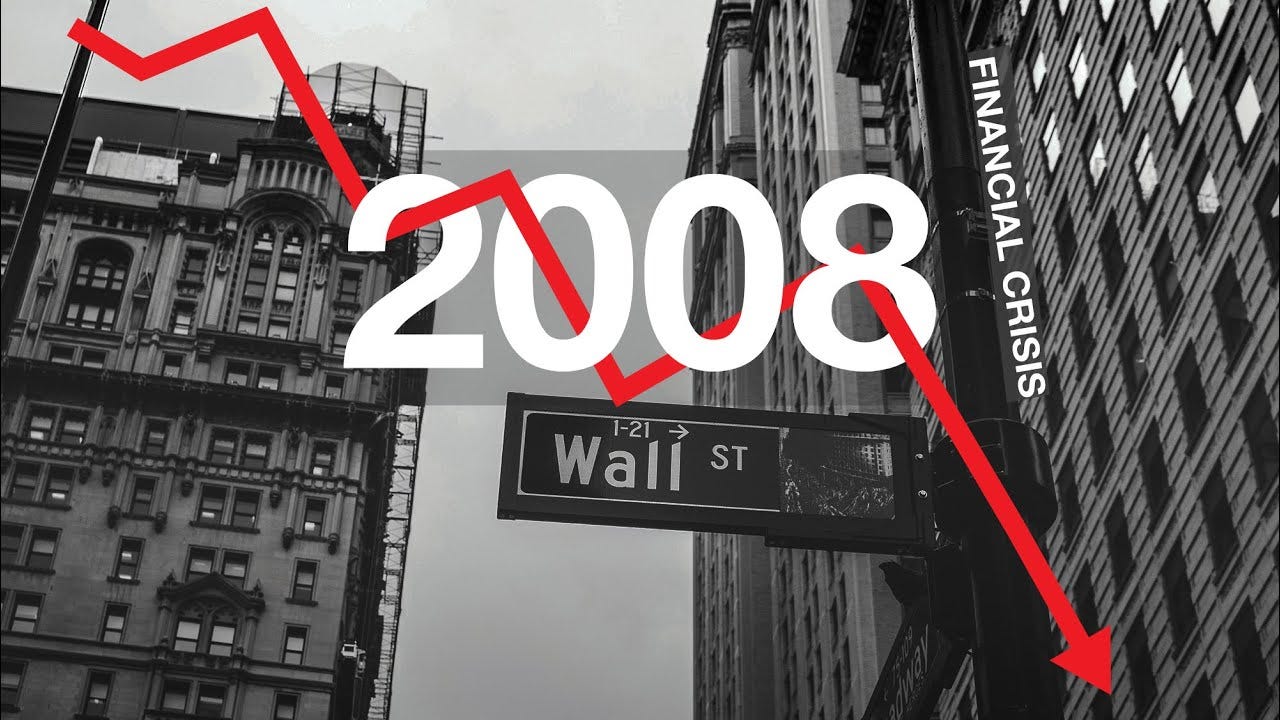5. The Power of Failure
How to find valuable lessons and growth in moments of adversity
Welcome! I’m Vincent and this is a Product Manager’s Notebook, a series of notes for people who are interested in sharing and learning the art of product management and career development. You can read my archive here.
If you appreciate reading this post, please consider liking and subscribing.
Ding. 🛎️
The year was 2008 and I was on a post-final exams trip with some of my best friends. After a few other stops in our adventure, we were at our final destination of Rome. Finally, the notification meant that our long-awaited Bachelor’s degree results had arrived by email.
For those unfamiliar with the British university system, a First meant you got 70% or over and aced your course. A 2.1 meant you did well (60%+), but weren't top of the class. A 2.2 means you got above 50%, whereas a Third meant you just about passed (40%+). Most students get a 2.1. Nervous, we each went into our own private corner of the Roman street to open our results.
I still remember very well the feeling of dread, as I opened the email.
Congratulations! Your result: 2.2.My heart dropped like a stone.
My friends had all gotten a First or 2.1, and started to congratulate each other on their well deserved result of the last three years. I could only sense a growing pit of deep despair in my stomach. In my mind, endless doors to my future career slammed shut. Most graduate programmes had a minimum 2.1 requirement, and any applications I made to these would now be automatically rejected.
The question loomed heavily over my future: now what?

As I mentioned in my post “Reflections to my 21 year old self”, it’s important to accept that failure is a part of our life and career. However, it’s the lessons we learn and how we respond to failure that help us to grow and ultimately succeed. We often celebrate successes and don’t talk nearly enough about the failures that often saved the road there.
In this piece, I’d like to share three of my own moments of failure that have shaped my career so far.
Lesson 1: The one where I almost failed my University degree
In hindsight, it shouldn’t have come as a surprise.
The first year of my degree didn’t count towards my final grade, and I’d spent a lot of that time in a tumultuous relationship. In my second year, I dedicated all of my energy and attention into my presidency of the Chinese student society: getting sponsorship, building a website, organising events, and creating a community for Chinese students in UK. It became an obsession, which I thought about at almost all times of the day. While the society became a success - we were nominated for Best Improved, Best Website and Best Student Society of the Year - my grades suffered as a result.
I spent my third year trying to catch up on everything I’d missed in my first two years and I didn’t study efficiently. When my friends mentioned that our final accounting exam was very similar to a past paper, I rued the fact that I hadn’t done any past papers. In fact, you could say that it was almost a miracle that I’d passed at all.
The 2008 Financial Crisis meant that the market was flooded with experienced professionals from collapsed investment banks like Lehman brothers and Bear Stearns. In the UK, Northern Rock became the first bank since the 19th century to experience a bank run. Even with the best qualifications, it was not a great time to be a graduate with ambitions to go into finance.
Over the next three years, I had to rebuild deliberately with the goal of making myself eligible again to enter finance.
I worked in Customer Service at RBS, where I learned telephone customer service by talking to 100+ daily customers over the phone
I moved to a different city to work in a finance function in private healthcare, where I learned to analyse paper trails for procedures and costs through the private healthcare system.
I passed 4 CISI exams to learn the basics of financial markets and regulation that make you an “Approved Person”, approved to work in the financial markets
Finally, I quit my job to put my head down, focus on wiping the slate clean by dedicating myself to a Master’s degree in Finance
With each step I took, I got myself closer to a new start. Finally, three years after I’d first graduated, I graduated again for the second time for my Master’s degree. This time the result was different:
Congratulations! Your final grade: First with distinction.In August of that year, I started my new role as an Equity data analyst at Bloomberg,. After all those additional years of work and study, it felt like my career in finance had finally begun.
Takeaway
It's never too late to start over if you fail the first time. As I dug into hospital records to find out why Mrs “Smith” was receiving debt collection notices for a cervical screen when she had had a hysterectomy (the removal of her cervix) many years before, I felt a million miles away from where I wanted to be. By identifying the qualities you need, and learning skills from your situations, it's possible to turn things around.
Lesson 2: The one where I repeatedly failed my professional qualification exams
The year was now 2019 and I was in Switzerland, in the midst of client visits, when I saw the heading for the email in my phone notifications:
“Your CFA Program Results”. I’d known this day was coming, because - of course I did. I could feel my heart racing as I decided to put off opening the email until I was finished with the day so as to avoid distracting from my client meetings. Finally, when the day was over, I got back to my hotel room and sat down on the sofa by the window.
“It’s time. This is it.” I thought to myself. “I’ve done absolutely everything I can. If I don’t make it this time, this just isn’t for me.”
I clicked on the email:
Relief. Overwhelming relief. It was finally over.
After I started my career in finance, I wanted to deepen my skills to become an equity research analyst or join the Buyside. Studying for the Chartered Financial Analyst (CFA) exams was a natural choice, as they are the hardest, and the most recognised qualification in the industry.
If you are new to the CFA, the qualifications are split out into three levels: Level I, II and III. The recommended study time per level is 300 hours, although many candidates spend much much more than that. Exams are only available to be taken once a year at a fixed location and date (this has changed a bit since Covid) with no opportunity to retake.
The exams are well known because of the hard work and dedication required for the breadth and depth of the material, and candidates devote all their time after work and weekends to study, missing important family events and gatherings along the way. In fact, I believe I still have (former?) friends who don't speak to me after I missed their weddings because they were weeks or days away from the CFA exam. It is not a fun time.
Some candidates pass each level at first attempt and complete the full course in the minimum of 3 years. Only roughly 15% of those who start Level I end up passing Level III. Here is what my journey looked like:
2013: Passed Level 1
2014: Failed Level 2
2015: Failed Level 2 again
2016: Took a break and got married
2017: Passed Level 2
2018: Failed Level 3
2019: Passed Level 3
In the end, it took me seven years to become a CFA Charterholder. I honestly never thought it would take that long. It turned out that studying for these challenging exams alongside full time work required a level of self discipline and motivation I needed to learn. With each “We regret to inform you”, I wondered: is this as far as I go or do I try again next year?
However, what kept me going was my dedication to the goal: that I was determined to be a CFA Charterholder and that all this time studying and sacrificing my time would not be wasted. Along the way, there were many who advised me to give up and pursue other directions, but I remained determined. After three failed exams, I also realized change was needed to my approach if I was finally going to get there.
For all the exams up to the last exam, I’d studied on my own. Study groups were a distraction, I thought, and in-person classes were way too restrictive or expensive. For the final Level III exam, I changed the way I studied and finally joined in-person classes.
Every weekend, I could be found sat right at the front of the class. I asked questions and sent emails to my teachers to ask clarifications on problems where I was stuck. I learned the curriculum inside out, and at last, I became the person who could help others when they got stuck on questions. And thank God I did, because the actual exam surprised many by changing the question format from previous years, tripping up candidates who didn’t fully understand the content.
And then one day, after all those years of sleepless nights, lonely weekends spent studying in empty office conference rooms, endless hours doing practice question after practice question, the moment that I thought might never come, finally did. My name was called and I stepped onto the podium to collect my certificate: Vincent Tong, CFA.

Takeway
When we fail, it’s important to look at what went wrong and change our approach to the problem. In this case, I found a new study style which finally was a breakthrough. They say the definition of insanity is to repeat the same things and expect different results. It’s important to realise when this is happening to yourself and step back to consider how to do better.
Lesson 3: The one where I repeatedly failed to get my dream job
The comments came from a good place but were unhelpful.
“It’s not your fault.”
“Try not to see this as a setback.”
“It is a very political process”
As I approached my ten year mark at the company, I knew very clearly that being a product manager was the only thing I wanted to do next. From the discipline of understanding customer problems, to the art of designing elegant solutions with others that also made business sense - I yearned to be given the opportunity to be make a difference. However, getting the job was anything but easy.
Over the course of 13 months, I had a total of 15 interviews for 4 different PM positions within the company. I spent countless weekends researching and preparing decks on business/product problems and technical design, based on case studies in the interview.
Over and over, I was rejected. Sometimes it was after three rounds, sometimes after five. No matter the reason, the fact was that I was failing to get the job I so sorely wanted. Truth be told, it was starting to hurt and I sensed myself falling into a dark place.
You start to question yourself:
Why won’t anyone give me a chance?
What’s wrong with me? What am I lacking that others have?
Do I need to leave the company I enjoy to be given a chance to do the job I wanted?
As time went by, I tried to do the following:
Ask/demand feedback after each process on what I could do better. And there was always a lesson to be learned
Motivate myself after a failed process to give full attention and try again when the next appropriate opportunity came along
Convince others who knew me to sponsor me by vouching for my performance and quality of work to hiring managers in product
After 13 months, the hiring manager for one of the unsuccessful applications suddenly had a new opening in their product team. They remembered me from the final rounds of the previous process, and finally gave me the opportunity I’d been waiting for. I will forever be grateful.
Takeaways
Giving up in the face of failure is the easier choice to make. However, if you truly believe in your goal, you owe yourself the grit and determination to try, try and try again.
Even when you have failed before, you need to put your all into your every next attempt. You never know if a closed door could reopen in the future.
Life is not always fair and within your control. Unlike your studies, career progression/opportunities are as much about your reputation and network, as (if not more than) your technical skills. Occasionally other people simply are a better fit than you, based on the role requirements, team dynamic, existing relationship with the hiring manager. Not every failure should be taken personally - even if it feels like it at the time.
As you progress in your career, your success becomes less solely based on your own efforts and achievements. You need allies who recognise your skills and are able to open doors for you.
Summary
In product management, we talk about the ability to fail fast. We love alliteration, you see. The idea is that you fail quickly, so that you learn your lessons and dedicate your resources to things that work well, instead of things that don’t.
In life, failing often does not feel fast. It can be crushing, demoralising, and demotivating, leaving you feeling drained and lost. However, the core of the “failing fast” still applies: trying to reflect on what lessons can be learned and moving on.
For me, the three key lessons from failure have been:
It’s never too late to start over.
It’s important to re-examine what you’re doing and learn how to do better
It’s key to build allies and bring people with you - for that’s key along your journey
And of course, grit and perseverance in the face of frustration and despair, to never give up and try and try and try again.
The road to success is paved with many failures, and surprisingly, it is in those moments of failure that we find our greatest growth. I’ve been blessed with many failures that have been fantastic learning opportunities. So will you.
When they happen, as they surely will, remember that this not the end. This is just a learning moment; a test of character that will make you stronger, smarter, and better. Without failure, there can be no success, and that success is just around the corner.
Thank you for reading! If this has been helpful for you, please do consider liking and subscribing, or even sharing the newsletter with others.








Thank you so much for sharing your thoughts, Vincent! This felt soooo personal.
From having a 2:2 and feeling like my world had ended to getting a Masters with high grades (I needed this validation) then finding myself in finance and passing my CISI exams (I passed my ASCI qualifying exam today).
As you said, 'the road to success is paved with many failures, and surprisingly, it is in those moments of failure that we find our greatest growth'.
Once again, thank you so much Vincent for choosing to document your thoughts. You have no idea how much it means to me.